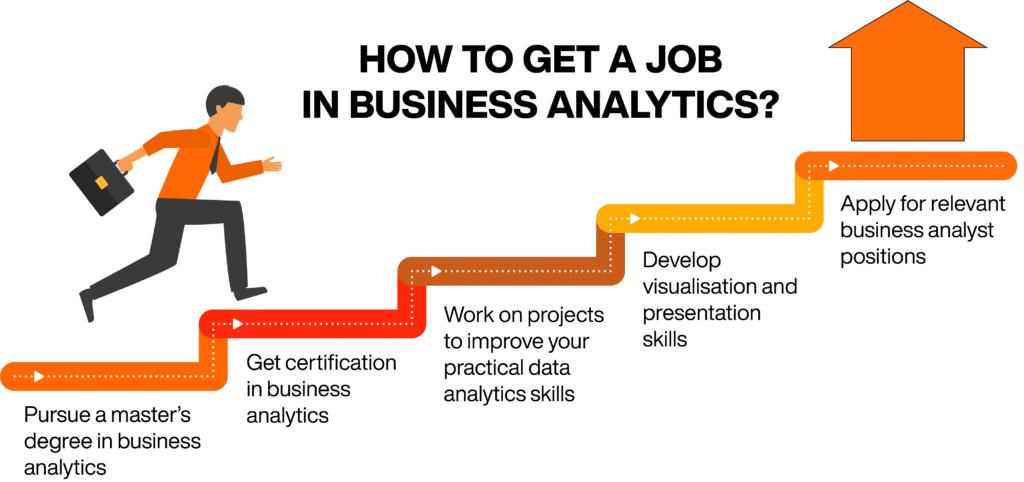Listen to this blog
Key takeaways:
- The major responsibilities of a business analyst consist of discovering, synthesising, and analysing information gathered from a vast array of sources
- To discover the underlying problems and causes, it is the business analyst’s role to address the genuine needs of the stakeholders, which often entails researching and identifying those needs
- Significant demand exists for business analysts. Due to this high demand, employment is very secure, and compensation is comparable to or higher than that of comparable industries
- Business analytics offers virtually limitless work opportunities
- A career in business analytics is possible either by taking up certificate courses or through professional experience
In today’s highly competitive corporate environment, business analytics has become an indispensable tool. Businesses across all industries generate vast quantities of data, resulting in a rising demand for people with data literacy and the ability to comprehend and assess diverse forms of information.
Business Analysts are at the centre of this enormous paradigm shift in the world economy and businesses. Business analysts are the professionals whose duties include systems and process analysis, project management, software development.
Since the possible range of changes that might be made to a corporation is comprehensive, the job description for a business analyst can likewise be fairly broad. Regardless of the individual’s degree of seniority or the industry in which they operate, a Business Analyst’s primary mission is to identify and develop solutions that will aid an organisation in attaining its goals and objectives.
This blog provides all the information necessary to help you make an informed decision regarding a future in business analytics and how to learn business analytics.
What is business analytics?
As firms seek to become more innovative and forward-thinking, the demand of the business analysts continues to rise. The extraordinary pace of the digitisation process has resulted in organisations having access to a plethora of data regarding every aspect of their operations. For a corporation to make sense of these numbers, they need someone who can analyse the data and generate actionable insights.
This type of responsibility lies on the shoulders of the organisation’s Business Analyst. They give top management a realistic picture of the company’s operations and advise them on improving its revenue-generating procedures and efficiency.
A Business Analyst’s most prominent job role is to assist a company in accomplishing its operational goals while maintaining its existing, realistic operational framework. This is performed by recommending the most efficient approaches for enhancing the framework.
Business Analytics (BA) currently employs various cutting-edge technology and methods to become more precise and results-oriented. R Programming, Tableau, Python, RapidMiner, Apache Spark, and Microsoft Excel are some of the highly acclaimed analytics technologies now accessible on the market.
READ MORE: What is Business Analytics: An overview
Is business analytics a good career?
You may not be very sure about how to learn business analytics or why learn business analytics. A career in business analytics seems highly beneficial and of the utmost scope. Consider pursuing a career in business analytics for the reasons listed below.
- High demand
There is a shortage of data experts with the required skills to satisfy the current demand in the business sector, and businesses in every area want these individuals.
- Transferable to a multitude of fields
Analytics is relevant to many areas, such as professional sports, manufacturing, banking, insurance, education, and entertainment.
- Dynamic growth
There cannot be an uninteresting moment in the life of a business analyst because this is a very active career path. These professionals face challenges daily and are committed to lifelong learning and development.
Because of the above mentioned reasons, business analyst scope in India is quite high and will continue to rise in the coming future.
Jobs and salaries in business analytics
| Job role | Average salary in India (PA) |
|---|---|
| Data Analyst | INR 5,50,000 |
| Market Research Analyst | INR 3,50,000 |
| Data Scientist | INR 11,00,000 |
| Management Analyst | INR 4,35,832 |
| Data Architect | INR 23,00,000 |
The following are the most prominent career pathways after completing business analytics courses in India, along with their salaries:
- Data Analyst
Average salary: INR 5,50,000
A data analyst’s major responsibility is compiling information on various topics through data evaluation. To complete the analysis, they must conduct surveys and collect the essential data. The data analysts also should present the data in an easily digestible fashion. They utilise numerous technologies, such as Microsoft Access, SQL, Microsoft Excel, and many others. Statistical analysis, data management, and report writing are the other skills this role requires.
- Market Research Analyst
Average salary: INR 3,50,000
A market research analyst who has completed business analytics certification courses is responsible for collecting in-depth reports, surveys, comments, and opinion polls from target audiences to evaluate market potential and aid an organisation in providing its products and services as effectively as possible. A market research analyst focuses on the desires and requirements of customers.
A marketing analyst assists businesses in getting insights into their products and services by selling them. They analyse marketing initiatives and industry trends using customer profiling, data analysis, and predictive statistics.
- Data Scientist
Average salary: INR 11,00,000
Using algorithms, artificial intelligence, machine learning, and other statistical methods, data scientists take complex, raw data from several sources and transform it into useful and transparent information to improve an organisation’s business strategy and operations.
- Management Analyst
Average salary: INR 4,35,832
A management analyst’s responsibility is to analyse data to examine the outcomes of a business problem or bottleneck that must be resolved. It is not the same as the job of a data scientist because the latter entails identifying and resolving crucial business difficulties that, if resolved, might provide immense value to the organisation. Even though data scientists and analysts may employ some of the same methodologies and procedures, the scope of the problems that each profession addresses are notably distinct.
- Data Architect
Average salary: Rs 23,00,000
The data architect is responsible for the blueprints that aid in data administration and production. These plans enable the centralisation, integration, and protection of databases. The data architects ensure that the data engineers have access to the necessary software and hardware platforms to conduct their testing precisely.
Typically, data architects have experience with data modelling and warehousing and extraction, transformation, and load (ETL). An expert understanding of Hive, Pig, and Spark technologies is frequently required.
How to start a career in business analytics?

Due to the nature of the business analyst career and the scope of its responsibilities, it is advisable to acquire various transferable skills while employed in this industry. Knowledge in a specific business area, such as workflow, billing, or customer relations, or knowledge of a whole industry, such as finance, telecommunications, or government, are both possible entry points for those interested in this field.
After being employed as an entry-level business analyst, you should prioritise participating in as many different types of projects as possible to develop experience. Later, you will be able to specialise in the domain or industry that intrigues you most. The expertise you have gathered along the road may assist you in identifying this industry.
It would help if you now understood the advantages and benefits of working as a Business Analyst; yet, getting there requires meticulous planning and academic perseverance. In order to pursue a profession in business analytics, it is necessary to comprehend the non-linear nature of the several certifications required. Transitioning from other professions into analytics is common among IT professionals, with academic credentials being the key determinants of a person’s position and income.
ALSO READ: How to become a business analyst?
Two approaches to to learn and build a career in business analytics
There are two broad approaches that you can adopt in order to develop your career in business analytics.
- Learn with certified courses and certifications
You will need to acquire computer programming skills in addition to your bachelor’s degree in business. Although different business analyst occupations require varying levels of technical competence, your chances of being hired as a candidate increase proportionally with your level of programming proficiency. The training is indispensable for understanding a business analyst’s duties and methodologies.
Business data analytics, operations research, project management, database analytics, and predictive analytics are frequently included in the curricula of these certificate programmes in business analytics given by a variety of graduate-level educational institutions, including Online Manipal.
- Gain experience through employment
Because business analytics is a diverse field, there is a need for professionals who are at ease acting as mediators, connectors, and facilitators between business and IT. Learning through jobs is another answer to how to start a career in business analytics. This is one reason why internships and other forms of work experience provide excellent opportunities to obtain knowledge on digital transformation trends and industry practices.
Regardless of whether you work in healthcare, education, insurance, or telecommunications, the size of the company will decide whether you are required to work throughout the entire organisation or are expected to focus on a specific area.
You can begin by getting experience through a volunteer position with a smaller company or taking advantage of summer internship opportunities. If a company already employs you in a different capacity, offer to assist with business analyst-related activities.
What will you learn in business analytics?
Many people ask this question- Is business analytics hard? The best business analyst certification course will emphasise the practical application of business analytics.
You are expected to attend a business analytics course to demonstrate that you possess the appropriate skill sets. The following are the four most important lessons you will study in your business analytics course.
- How to calculate company value
A business analytics certification course will equip you with the knowledge necessary to delve deeply into values and efficiently convert them for business applications. When transformed into quantifiable numbers, these qualities can assist a corporation in expanding its business proposition in real-time. You become an asset to your firm by assisting it in utilising data to advance the company’s core values.
- Make informed and prudent decisions for the benefit of your organisation
The second thing you will study in a course on business analytics is how to comprehend the power of making good selections. Real-time, quick analysis is essential for the success of any business. In addition, the capacity to make deliberate and well-considered judgments is a crucial asset for any organisation.
Once you have mastered the talent of making the most ideal and perceptive selection based on the numbers, you will be able to save time for your company. Only via the application of proper analytics can an informed decision be made. Utilise pertinent data to produce creative ideas and precise projections for your firm’s future.
- How to visualise data to gain comprehensive information
In this analytics course, you will learn how to examine visual data more closely in order to identify trends. Through visual data evaluation, one can more precisely identify agile and swifter patterns. You can quickly assess what will work and what will not be based on the most recent market trends, which are readily apparent in the visual data. Analysing charts and graphs will become second nature to you as your ability to make educated decisions more rapidly than ever improves.
- Your role is to push your company ahead of the competition
A business analytics course will also teach you how to keep a competitive edge while analysing data. To accomplish this, you must continue gaining knowledge from real-world experiences.
Skills required in business analytics
In case you are interested in a career role related to business analytics, you should be aware that job descriptions for business analyst positions often require both specialised and general abilities, such as the following:
- Technical skills
To discover business solutions, business analysts must be deeply aware of existing and emerging technology platforms. This will allow them to determine the prospective outcomes that can be attained via both existing applications and new offers. The ability to evaluate software tools and develop mission-critical systems for an organisation are considerable technical skills typically required in contemporary job descriptions for business analysts.
- Communication
Business analysts interact with clients, end-users, management, and other developers. It is essential for the success of any project that business analysts can effectively communicate information such as requested changes, testing results, and project requirements. Excellent communication skills are a fundamental necessity for a business analyst.
- Analytical skills
A business analyst’s skill set should include strong analytical abilities for evaluating and translating customer requirements into operational procedures. In the majority of job descriptions for business analyst positions, exceptional analytical skills are included as needed qualifications. These skills enable the analyst to study documents, data, user surveys, and workflows, all of which contribute to creating solutions to problems.
- Decision-making
Every job description for a business analyst expects individuals to have a high capacity for making informed conclusions. Business Analysts must be able to examine stakeholder input, assess the issue, and select the most appropriate course of action. The ability of business analysts to make judgments will significantly impact an organisation’s survivability, both in terms of its ability to continue existing and generate profits.
- Managerial skills
A business analyst’s duties include, but are not limited to, planning the scope of a project, directing a team, estimating budgets, managing change requests, and monitoring deadlines. Due to the multidisciplinary nature of the business analyst role, a high level of management skills is essential to oversee projects from beginning to end properly.
READ MORE: 15 key skills and tools business analysts needs to succeed
Conclusion
Consider pursuing a career in business analytics if you are interested in working in business and data science fields. You must have now received all answers related to how to learn business analytics. This is an outstanding option. To thrive in business analytics, all you need are the necessary qualifications and skill set, despite the perception that entering the profession is challenging.
If you feel that a career in business analytics would better suit your interests, you are welcome to enrol in our course in Business Analytics. If you are interested in pursuing a career in business analytics, you will benefit from the business analytics programme offered by Manipal Academy of Higher Education (MAHE) through Online Manipal because its primary focus is the collection of data for decision-making. If you possess this capacity, your work as a business leader will be considerably simpler.
Become future-ready with our online M.Sc. in Business Analytics program













